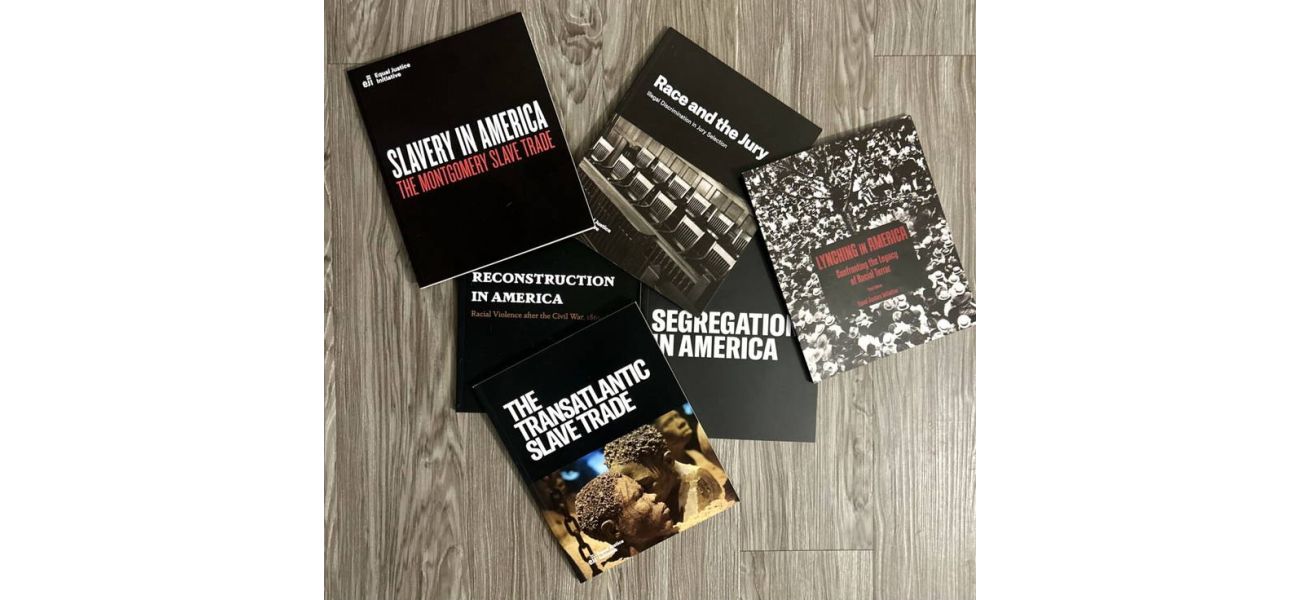EJI books are essential reading all year round, not just during Black History Month.
Bryan Stevenson, a lawyer and advocate for social justice, started the Equal Justice Initiative (EJI).
February 28th 2025.

Recently, there has been a concerning trend among right-wing groups to erase Black history from the education system. Despite this, African Americans have always been resilient and resourceful in preserving our history. We come from a culture of oral storytelling, where critical information has been passed down from generation to generation. While oral history is valuable, it is also important to document our past. In 1989, Bryan Stevenson, a passionate attorney and social justice advocate, founded the Equal Justice Initiative (EJI) to provide factual research and education on racial injustice. This ensures that the history of systemic racism and the ongoing fight against it is never forgotten.
Through EJI, several books have been published to shed light on Black historical events and facts. What makes these books even better is that they are affordable, priced at just $6 on the organization's website. As we celebrate the last day of Black History Month, there is no better time to delve deeper into the history and experiences of Black Americans and carry that knowledge beyond this month of recognition. BLACK ENTERPRISE has selected six insightful books from the Equal Justice Initiative that offer a better understanding of our past and its impact on the present. Knowing our history empowers us to confront the current challenges of racial inequality.
One of the books published by EJI is "Race and the Jury," which takes a critical look at the widespread racial discrimination in jury selection within the U.S. legal system. The report highlights how Black individuals and other people of color are systematically excluded from participating in jury duty at various stages. This exclusion not only undermines the fairness of trials for marginalized individuals but also weakens public trust and compromises the integrity of the justice system. The report emphasizes the need for reforms to ensure diverse and representative juries.
Another book, "Segregation in America," reveals the resistance of many white Americans to the Civil Rights Movement. It is no secret that white people opposed Black individuals from having the rights granted to them by Constitutional Law. In many cases, this opposition was met with violence, in an attempt to uphold racial segregation and prevent progress towards equality. EJI stresses the importance of acknowledging this widespread resistance to understanding the racial disparities that exist today. Confronting this history is crucial in working towards a more just and inclusive society.
The book "Lynching in America" sheds light on the violent strategy used to intimidate Black citizens and maintain racial oppression in the United States. The report lists over 4,400 racially motivated lynchings that occurred between the Reconstruction Era and World War II. It also highlights the overwhelming support for these horrific acts, which were often carried out publicly as a form of entertainment for racists. These murders were meant to terrorize Black communities and reinforce white supremacy. The report delves into the lasting impact of racial terror during the Jim Crow Era and its role in shaping racial injustice today.
The "Reconstruction in America" report uncovers nearly 2,000 additional confirmed racial terror lynchings of Black individuals by white mobs, expanding our understanding of this violent chapter in Black history. It focuses on the 12 years after the Civil War, a time when white leaders fostered lawlessness and violence to establish a society built on racial inequality, white dominance, and Jim Crow laws. This period marked the beginning of a long-lasting legacy of systemic racism that still affects the country today. The report highlights the consequences of this era and the need for continued efforts towards racial justice and reconciliation.
The book "Slavery in America" examines the horrific history of the transatlantic slave trade, where millions of Africans were kidnapped and transported to the Americas under brutal conditions. Around two million people died during the journey, and the enslavement of Black individuals helped build wealth and prosperity for many in the U.S. The city of Montgomery, where EJI is located, was a region that actively participated in the slave trade. It was notorious for its slave market, where enslaved people were auctioned off. The location of the Montgomery slave trade is just a stone's throw away from EJI's center. In fact, the Legacy Museum, which is dedicated to those who were lynched, is built on the site of a former slave warehouse.
Lastly, the EJI report on the "Transatlantic Slave Trade" delves into the economic impact of this dark chapter in history. From 1501 to 1867, millions of Africans were stolen, shipped across the Atlantic Ocean, and enslaved in the Americas. These individuals were separated from their families and cultures, and coastal cities in the U.S. grew wealthy from the exploitation and ownership of Black people. The report highlights how this trade created wealth for Europeans and white Americans while reinforcing a racial hierarchy that continues to contribute to racial disparities in America today.
In conclusion, the Equal Justice Initiative and its published works offer a valuable resource for understanding and learning about Black history. As we continue to fight against systemic racism and work towards a more just and inclusive society, it is crucial to confront our past and acknowledge its ongoing impact. Let us use the knowledge gained from these books to empower ourselves and create a better future for all.
Through EJI, several books have been published to shed light on Black historical events and facts. What makes these books even better is that they are affordable, priced at just $6 on the organization's website. As we celebrate the last day of Black History Month, there is no better time to delve deeper into the history and experiences of Black Americans and carry that knowledge beyond this month of recognition. BLACK ENTERPRISE has selected six insightful books from the Equal Justice Initiative that offer a better understanding of our past and its impact on the present. Knowing our history empowers us to confront the current challenges of racial inequality.
One of the books published by EJI is "Race and the Jury," which takes a critical look at the widespread racial discrimination in jury selection within the U.S. legal system. The report highlights how Black individuals and other people of color are systematically excluded from participating in jury duty at various stages. This exclusion not only undermines the fairness of trials for marginalized individuals but also weakens public trust and compromises the integrity of the justice system. The report emphasizes the need for reforms to ensure diverse and representative juries.
Another book, "Segregation in America," reveals the resistance of many white Americans to the Civil Rights Movement. It is no secret that white people opposed Black individuals from having the rights granted to them by Constitutional Law. In many cases, this opposition was met with violence, in an attempt to uphold racial segregation and prevent progress towards equality. EJI stresses the importance of acknowledging this widespread resistance to understanding the racial disparities that exist today. Confronting this history is crucial in working towards a more just and inclusive society.
The book "Lynching in America" sheds light on the violent strategy used to intimidate Black citizens and maintain racial oppression in the United States. The report lists over 4,400 racially motivated lynchings that occurred between the Reconstruction Era and World War II. It also highlights the overwhelming support for these horrific acts, which were often carried out publicly as a form of entertainment for racists. These murders were meant to terrorize Black communities and reinforce white supremacy. The report delves into the lasting impact of racial terror during the Jim Crow Era and its role in shaping racial injustice today.
The "Reconstruction in America" report uncovers nearly 2,000 additional confirmed racial terror lynchings of Black individuals by white mobs, expanding our understanding of this violent chapter in Black history. It focuses on the 12 years after the Civil War, a time when white leaders fostered lawlessness and violence to establish a society built on racial inequality, white dominance, and Jim Crow laws. This period marked the beginning of a long-lasting legacy of systemic racism that still affects the country today. The report highlights the consequences of this era and the need for continued efforts towards racial justice and reconciliation.
The book "Slavery in America" examines the horrific history of the transatlantic slave trade, where millions of Africans were kidnapped and transported to the Americas under brutal conditions. Around two million people died during the journey, and the enslavement of Black individuals helped build wealth and prosperity for many in the U.S. The city of Montgomery, where EJI is located, was a region that actively participated in the slave trade. It was notorious for its slave market, where enslaved people were auctioned off. The location of the Montgomery slave trade is just a stone's throw away from EJI's center. In fact, the Legacy Museum, which is dedicated to those who were lynched, is built on the site of a former slave warehouse.
Lastly, the EJI report on the "Transatlantic Slave Trade" delves into the economic impact of this dark chapter in history. From 1501 to 1867, millions of Africans were stolen, shipped across the Atlantic Ocean, and enslaved in the Americas. These individuals were separated from their families and cultures, and coastal cities in the U.S. grew wealthy from the exploitation and ownership of Black people. The report highlights how this trade created wealth for Europeans and white Americans while reinforcing a racial hierarchy that continues to contribute to racial disparities in America today.
In conclusion, the Equal Justice Initiative and its published works offer a valuable resource for understanding and learning about Black history. As we continue to fight against systemic racism and work towards a more just and inclusive society, it is crucial to confront our past and acknowledge its ongoing impact. Let us use the knowledge gained from these books to empower ourselves and create a better future for all.
[This article has been trending online recently and has been generated with AI. Your feed is customized.]
[Generative AI is experimental.]
0
0
Submit Comment





